FOCUS ON RESULTS
General Lord Sir Richard Dannatt on the ticking clock of the Russia-Ukraine War PAGE 5


General Lord Sir Richard Dannatt on the ticking clock of the Russia-Ukraine War PAGE 5

The Georgian State Security Service on Monday released information on an investigation looking into members of the Center for Applied Nonviolent Actions and Strategies (CANVAS), a Serbian nongovernmental organization, and USAID, suggesting its belief that USAID is funding a revolution.
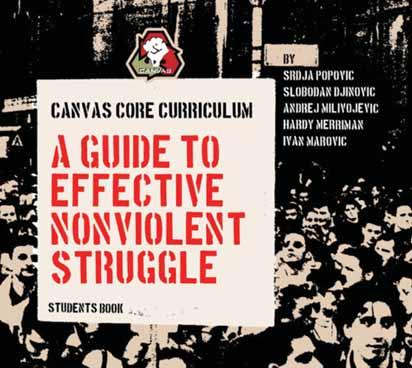
Former Prime Minister and leader of the ‘For Georgia’ party, Giorgi Gakharia, responded to the allegations, blaming the Georgian Dream (GD) party for preparing a "revolutionary scenario" in the country.
Gakharia claimed that GD is afraid of losing the 2024 elections and of protests, and as such is waging “hybrid warfare against its citizens by threatening them with a baseless security service investigation, suppressing freedom of assembly, and blaming USAID for supporting alleged revolutionary scenarios in Georgia.”
“This anti-Western government can’t break Georgia’s longstanding strategic partnership with the US. The people of Georgia will preserve it through peaceful, democratic political change,” he emphasized.
The State Security Service (SSSG) on Monday released information about the investigative action conducted against the organization CANVAS and made public “part of the evidence”.
In this week’s issue...
Armenian Parliament Ratifies ICC Rome Statute, Moscow Not Happy
NEWS PAGE 2
NGOs Ask Gov't Not to Adopt Draft Law Restricting Freedom of Assembly/ Expression
POLITICS PAGE 4
Impeachment Updates: Kobakhidze Demands President’s Resignation ahead of Court Decision
POLITICS PAGE 4
The Young Georgians Full of Resolve and Expertise
POLITICS PAGE 6
73.2 Million GEL Allocated for Starring Georgia Campaign
BUSINESS PAGE 6
When Rafail Danibegashvili Came to India
CULTURE PAGE 10
Renowned Musical ‘Chicago’ Hits the Stage in Tbilisi
CULTURE PAGE 11
Source: eu4georgia.eu
Trucks, funded by the EU and procured by IOM, with a total value of EUR 790,000 (GEL 2.25 million), will further develop the abilities of the Georgian Border Police in efficiently supplying border guards serving at remote border divisions and sectors with required provisions and materials.

Deputy Minister of Internal Affairs, Aleksandre Darakhvelidze, and the Head of Border Police, Nikoloz Sharadze, welcomed Nicholas Cendrowicz, Head of Cooperation of the EU Delegation to Georgia, and Sanja Celebic Lukovac, IOM Chief of Mission, to the formal donation ceremony.
The donation of 10 trucks with short wheelbase, able to access localities with extremely rugged terrain, will positively boost the Border Police’s capabilities to
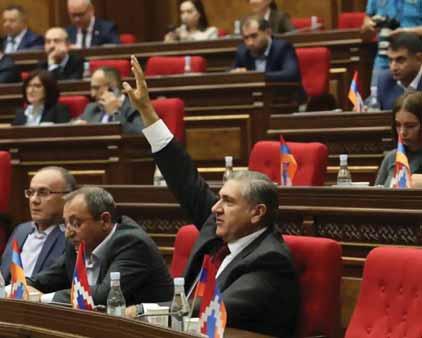 BY LÉA MONTAGNE
BY LÉA MONTAGNE
On Tuesday October 3, Armenia decided to ratify the Rome Statute, the founding treaty of the International Criminal Court (ICC). That decision immediately got a rection from Moscow, which claimed Armenia’s move as “extremely hostile” towards Russia.
A BRIEF HISTORY: ARMENIA
BECOMING THE 124TH MEMBER
TO SIGN THE ROME STATUTE
supply their border guards in remote green border areas. Ultimately, utilization of these vehicles will reduce the supply costs and ensure logistical effectiveness and efficiency of border units at the green border.
The action titled “Border and Migration Management Action for Georgia (BMMAG)” was launched in 2022 under the EU Resilience Facility. The overall objective of the project is to support the Government of Georgia in sustaining more effective border management and migration governance.
The project follows up on comprehensive EU support in the last 10 years, dedicated to strengthening Georgia’s migration and border management capabilities, to cement compliance with relevant EU-Georgia Agreements and the visa liberalization benchmarks.
While Armenia initially signed the Rome Statute in 1998, it took 25 years for Armenia to ratify it. In 2004, Armenia’s Constitutional Court ruled that the Rome Statute conflicted with the country’s Constitution, mainly because the national jurisdiction of Armenia was not complementary with the ICC. Since then, the Armenian Constitution has been modified twice, in 2005 and in 2015, to better fit candidacy for the ICC. On March 24, 2023, the Constitutional Court of Armenia finally determined that there was no longer any constitutional conflict regarding ICC membership.
Where Russia was a historical ally for Armenia, joining the ICC now jeopardizes those relations. Indeed, the ICC has issued an arrest warrant for Vladimir Putin, who was indicted for war crimes against Ukraine’s citizens.
The United Nations condemned, among
others, the massive number of civilians killed, the destruction of cultural heritage and civilian infrastructure, the deportation of children and the violation of their right to Ukrainian identity. These serious allegations led the ICC to issue a warrant against President Putin and Ms Maria Alekseyevna Lvova- Belova, Commissioner for Children’s Rights.
It implies that every ICC member country, including now Armenia, has the obligation to arrest the Russian President if he sets foot on their soil and to extra-
dite him to the Hague Court.
The Armenian Prime Minister, Nikol Pashinyan, insisted that this ratification was not aimed at Russia, but that it was necessary to guarantee that Armenia will be protected by international law against Azerbaijan.
Armenia has denounced Russia’s inaction while fighting against a richer and better armed country, which the Kremlin denies. As such, relations between Russia and Armenia are indeed growing more vulnerable of late.
The dramatic ouster of US House Speaker Kevin McCarthy has raised questions about the future of the country’s supply of aid to Ukraine.
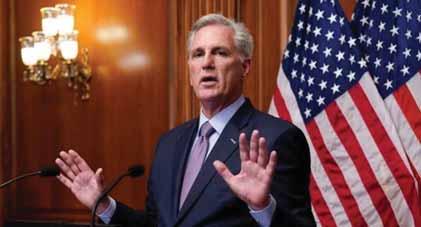
McCarthy, who was backing US support for Ukraine, was removed in a no confidence vote led by members of his own party on Tuesday.
That comes amid a growing divide within the Republican party over the continuation of US aid. The US is by far the biggest provider of military aid to Ukraine.
Lawmakers earlier in the week suggested McCarthy arranged a standalone vote on Ukrainian aid with President Joe Biden in order to pass a government spending bill which did not contain provisions. McCarthy denied there had been a so-called “secret side deal.”
“President Biden made clear we cannot, under any circumstances, allow America’s support for Ukraine to be interrupted,” White House national security spokesperson John Kirby told reporters, according to a Reuters report, referring to Biden’s call with allied leaders Tuesday.
President Biden has told his counterparts in a number of allied countries that he remains confident that Congress will approve military and humanitarian assistance for Ukraine “for as long as it takes” in spite of opposition among some Republicans that blocked funding over the weekend.
In a call on Tuesday morning, Mr. Biden spoke with the prime ministers of Canada, Italy, Japan, and the United Kingdom, and the presidents of Poland and Romania. The Chancellor of Germany and the foreign minister of France also joined the call, along with the leaders of the
European Commission, the European Council and NATO.
John Kirby, a spokesman for the National Security Council, said early in the afternoon that Mr. Biden had told the leaders that “we cannot under any circumstances allow America’s support for Ukraine to be interrupted. Time is not our friend.”
Russia’s Defense Ministry said it downed 31 Ukrainian drones Tuesday in the border regions of Belgorod, Bryansk and Kursk, without citing any casualties or damage.
The Ukrainian armed forces separately said its anti-aircraft defense systems destroyed one Iskander-K cruise missile and 29 Shahed drones.
Ukraine also said Russia had launched five rocket and 108 airstrikes over the past day. Residential buildings and civilian infrastructure were damaged and there were civilian injuries and casualties, the army said.
Analysts say that Russia has been using a tactic known as “elastic defense,” which involves ceding ground and then striking back, to prevent Ukraine from holding certain positions as staging grounds for future attacks.
Across desolate fields and shattered villages, Ukraine’s counteroffensive is confronting Russian minefields and Russian soldiers dug into elaborate trench networks.
But one unusually daunting obstacle to Ukrainian troops is a tactic adopted by Russian forces: ceding ground and then striking back.
Rather than holding a line of trenches at all costs in the face of Ukraine’s assault, security experts say, Russian commanders have employed a longstanding military tactic known as “elastic defense.” Little ground has changed hands as
Ukraine seeks a battlefield breakthrough Ukraine and Russia have been fighting intense battles since June, when Kyiv launched a counteroffensive buoyed by billions of dollars in military aid from NATO allies, but relatively little ground has changed hands. Here’s a look at the state of the battlefield:
The main thrust of Kyiv’s counteroffensive is taking place in southern Ukraine in the western half of the Zaporizhzhia region. Ukraine took the village of Robotyne last month after weeks of combat. There have since been reports of other small advances. Ukraine needs to push through miles of territory and minefields before it reaches the fortified city of Tokmak, some 15 miles southwest of Robotyne. After that, Ukraine’s next objective in that part of the front line could be the city of Melitopol, which is around 31 miles from Tokmak.
In eastern Ukraine, Ukraine’s military said this month it had retaken the tiny villages of Klishchiivka and Andriivka,
just south of the Russian-controlled city of Bakhmut. Putting pressure on Russian forces in the city, which fell in May after one of the war’s bloodiest battles, is one apparent goal of the counteroffensive. Some US intelligence and military officials said in August they were perplexed by Kyiv’s focus on Bakhmut, a position rejected by Ukraine.
There has been heavy fighting in other sectors in Donetsk province. Close to the regional capital, Donetsk, Russian forces have conducted ground attacks near Marinka and Adviivka, but have been repelled, according to Ukraine’s military. Moscow has targeted the towns since the first days of its full-scale invasion 19 months ago.
For their part, Ukrainian forces have pushed south since June from a front line close to the town of Velyka Novosilka. In August, they took the village of Urozhaine.
In the northeast, Moscow has seized a small amount of territory since the summer in fighting for villages east of the city of Kupiansk, the only sector in which Russia has made a concerted recent effort
to advance. Military experts say the attacks are likely partly aimed at forcing Ukraine to divert troops from its main counteroffensive thrust.
President Volodymyr Zelensky visited troops near Kupiansk on Tuesday to hand out medals and inspect military equipment, including Leopard tanks that have been donated by the country’s NATO allies in Europe. His Telegram account posted a video of him in a forest shaking hands with a small group of soldiers, who appeared to include older men — a sign of the toll the war has taken on Ukraine.
THE KHERSON REGION
Last November, Ukraine retook the southern city of Kherson, forcing Moscow to retreat to the eastern side of the Dnipro River.
Since then, Ukraine has launched raids along the eastern bank amid fighting for river islands. Russia has shelled the river’s western bank repeatedly. In June, the destruction of the river’s Kakhovka hydroelectric dam, in an explosion likely caused by Russian forces, caused environmental devastation.
THE
The Black Sea has become a main center of conflict. Ships from Russia’s Black Sea Fleet have launched deadly missile strikes across Ukraine, and Kyiv has increasingly been using drones and missiles to try to undercut Moscow’s naval dominance. Since August, Ukraine has damaged a Russian warship in a drone strike and hit Moscow’s naval headquarters in occupied Crimea.
Ukraine has also repeatedly attacked the bridge that joins Russia to the Crimean Peninsula, which Moscow illegally annexed in 2014. In turn, Russia has targeted Ukraine’s ports on the Danube River and the Black Sea, including Odesa, hampering its ability to ship grain.
On September 25, they say, at the invitation of the East-West Management Institute of the USAID program, Serbian citizens Sinisa Sikman, Jelena Stoisic and Slobodan Jinovic arrived in Georgia. According to the SSSG, these persons are connected with the 2003 revolutionary events in Georgia, and in different years they also had connections with similar processes in Serbia, Ukraine and other states.
The SSSG further claims that these individuals were actively teaching methods of creating protest drives and tactics for the conducting of violent protests. They added that they represent the management link of the “Canvas” organization. Further claims are that Sinisa Sikman and Slobodan Jinovic are former members of the “Otpor” organization, which was an analog of the Georgian organization “Kmara” in Serbia.
The SSSG says the individuals officially came to Georgia to conduct trainings for groups working in the field of culture in matters of “strategic non-violent fight,” but the investigation established that this was not the only purpose of their arrival in Georgia. “In particular, the real purpose of the visit was to establish communication and conduct trainings with those young people and influential non-governmental organizations which were to become the core of destructive and illegal actions planned in Georgia in October-December of this year,” the SSSG claimed.
“We will, of course, need to clarify why USAID funded such training, the direct purpose of which was to prepare for a revolution in Georgia. We will allow
neither a revolution nor a second front,”
Georgian Dream chairman Irakli Kobakhidze responded, claiming that the scenario is unrest, revolution, and that the final goal is a second front for the Ukraine war.
CANVAS representatives strongly denied the allegations that it was fomenting violent unrest in Georgia.
“All of our programs and trainings,
taught in over 50 countries, are based on the non-violent struggle curriculum that is publicly available online,” their statement reads. “The State Security Service of Georgia decided to create a national controversy out of nothing, since the content of the training course was previously known, held at a public location, and aimed to support civil society organizations in Georgia, to better equip
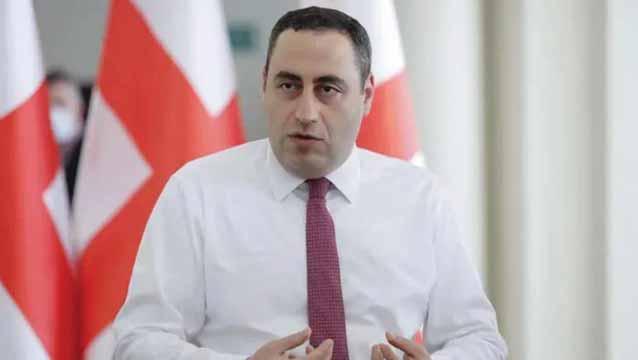
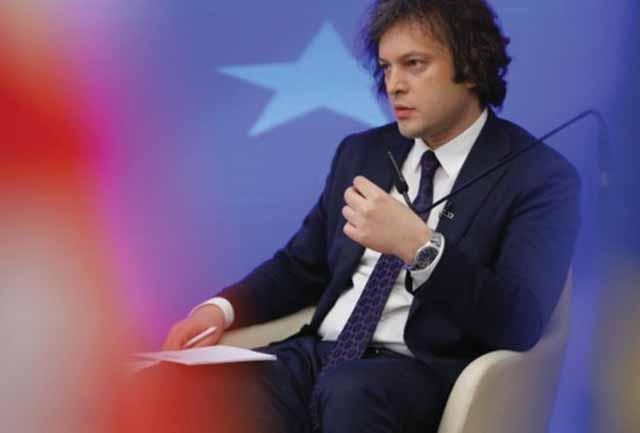
them with tools and knowledge on community organization and advocating for positive social changes.”
The statement adds that “no legal documents presenting an investigation” were given to the three CANVAS trainers that were interrogated on September 29, and neither could they make a statement since they were bound by nondisclosure rules.”
The organization claims the SSSG allegations are part of a “larger smear campaign that Georgian security agencies are conducting against civil society in Georgia and the CANVAS staff in Tbilisi” and links them “with a successful civic campaign carried out in Tbilisi from February to March of 2023 against the so-called ‘Russian Law.’”
The US Embassy also responded to the above allegations, claiming that they are fake.
“Allegations made publicly today against one of our assistance projects are false and fundamentally mischaracterize the goals of our assistance to Georgia,” the Embassy wrote. “USAID has been supporting the Georgian people since 1992. As always, our assistance is transparent, and we welcome any opportunities to discuss any concerns the government may have.
“The right of citizens to freely voice their concerns and aspirations is foundational to any democracy, and is a value shared by both of our countries. USAID has collaborated with CANVAS for more than two years to help people to speak up for the issues that matter to their families and communities. We have partnered with CANVAS to deliver training to mothers advocating for better cancer treatments for children, and to people advocating for the rights of elderly citizens in their communities,” reads the statement.
According to the Embassy, despite these unwarranted attacks, they will continue to support Georgian organizations who support people to secure the future they determine and deserve, and to secure their fundamental rights guaranteed by the Georgian Constitution.
If we do not attend the voting, how can we vote? Gakharia’s party, Daushvili and others are talking so much that I think they are themselves planning to vote for it – it makes me wonder if Gakharia is part of Bidzina’s game, – Giorgi Vashadze, the leader of the Strategy Builder party, told journalists in response to Mikheil Daushvili, a member of the For Georgia party, who claimed members of the National Movement will vote for the impeachment of President Zurabishvili.
Vashadze added that there is a zero chance of anyone from the Strategy Builder or National Movement parties voting for the impeachment.
“Their statements are so unbearable, we have to ask after their mental health. If you want to vote, don’t blame others, go and vote. People will know that you are also playing Bidzina’s game. I say again, there is zero chance of anyone from Strategy Builder or National Movement voting for the impeachment. I think they really want to vote themselves and it will be clear, in the end, that they are part of Bidzina’s game,” Vashadze said, adding that the impeachment of President Zurabishvili “will end in farce and fiasco”.
“Bidzina is putting on a show. On one
side they have actor Kobakhidze, on the other side actor Zurabishvili. We have been watching this for two or three days. I ask you a question: where is the citizen of Georgia and his interest in this process? Where is the interest of Georgia and its European integration? I can see none of these things. Unfortunately, this is a farce from beginning to end, which will end in fiasco.
“The next president will not be directly elected: He will be chosen by the Dream, Partskhaladze’s defenders, deputies, council members, etc, those who protect Partskhaladze. These people will elect the next president. It is impossible for the opposition to agree to it,” said Vashadze.
Turkey's President Tayyip Erdogan reviews a guard of honour as he attends the reopening of the Turkish parliament after the summer recess in Ankara, Turkey, October 1, 2023. Murat Cetinmuhurdar/PPO/ Handout via REUTERS THIS IMAGE HAS BEEN SUPPLIED BY A THIRD PARTY. NO RESALES. NO ARCHIVES
After the 1st of October’s bombing attack in Türkiye, President Erdogan spoke before the Parliament and declared his irritation towards the European Union.
The Turkish president stated that the EU has made Türkiye “waits at its door for 40 years,” and added that Türkiye was
no longer excepting a late EU decision. Erdogan also claimed, “we have kept all the promises we made to the EU, but they kept almost none of theirs”. He added that Türkiye will not be accepting any new requirements or conditions from the EU. This speech came in response to a recent claim of violation from the European Convention on Human Rights (ECHR) after Türkiye condemned a man for using the encrypted messaging ByLock, considered by Ankara as a tool of the armed terrorist organization responsible for the 2016 coup attempt. The ECHR considers this act as a ‘violation of the right to a fair trial, to no punishment without law and to freedom of association’, Erdogan however said “Turkey will not step back in its fight against this gang of traitors. It will not allow any return to the past.”
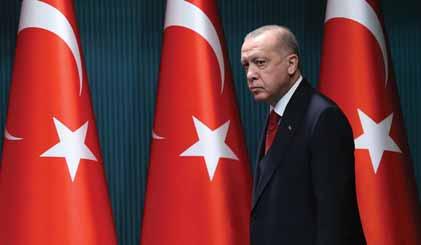
The decision to start this impeachment procedure was made after the President's violation of the Constitution of Georgia gained a systemic character. We no longer consider Salome Zurabishvili worthy of the presidency, - the Chairman of Georgian Dream Irakli Kobakhidze stated in the Constitutional Court this week, where the impeachment of the President is being considered.
In response to the judge's question, Kobakhidze explained the motivation behind Georgian Dream starting the impeachment procedure, seeing him claim that although the ruling team knows that it does not have the relevant resources in Parliament, the starting point for them is that “the President, as a rule, should resign.”
“Initiating the impeachment procedure is a political decision. In 2022, we also made a political statement that the President of Georgia had violated the Constitution of Georgia. She applied to the government in April 2022, if I'm not mistaken, to get approval for the visits [to the EU], she was refused, and yet still made the corresponding visits. We did not suggest impeachment then, due to the fact that at some point she changed this practice and did not repeat it for
some time. She consulted with us and later consent was given for certain visits. However, the decision to submit for impeachment was made after the President's violation of the Constitution of Georgia gained a systemic character.
When you initiate impeachment, from our point of view, it means that we no longer consider Salome Zurabishvili worthy of the presidency,” Kobakhidze said.
“We said from the beginning that we do not expect 100 votes. We have a reasonable assumption that Ms. Salome Zurabishvili was violating the Georgian Constitution in the hope of gaining support from the opposition, but the ultimate goal and starting point of impeachment is that the President, as a rule, should resign. This will be our goal, and if the Constitutional Court
presents a positive conclusion to the Parliament regarding the violation of the Constitution, all relevant deputies will support the impeachment of the President. This is our political intention,” he added.
The consideration of the impeachment submission of President Zurabishvili in the Constitutional Court of Georgia has been ongoing since October 3. The issue is being considered by the plenum of 9 judges of the Constitutional Court.
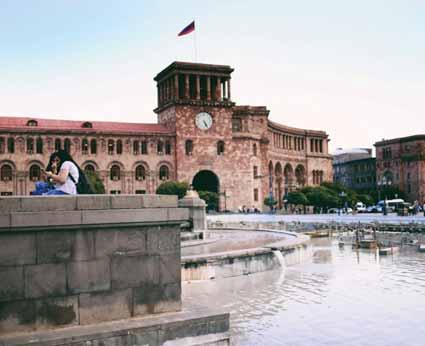
The Chairman of Georgian Dream Irakli Kobakhidze and other members of the ruling party, Anri Okhanashvili, Giorgi Kakhiani and Tengiz Sharmanashvili, have been present at the sessions as the authors of the submission.
Giorgi Tevdorashvili, the judge of the Constitutional Court, stated that the court will have a report on the impeach-
ment of the President prepared by midOctober.
“Certainly, the case is an important one, and the court will prepare a report within the one-month period stipulated by the Constitution,” Tevdorashvili told journalists. “Naturally, one month was counted from the filing of the lawsuit in the court, and by the middle of October, by October 14-15, the conclusion should be ready.”
The issue of impeachment of the President was decided at the meeting of the political council of the Georgian Dream party on September 1. The Constitutional Court has a one-month deadline to prepare its opinion. In case of a positive decision by the court, 100 deputies' votes are needed to dismiss the President, which the majority of Georgian Dream does not have.

Members, MPs and supporters of the
‘For Georgia’ party on Tuesday held a rally in front of the Constitutional Court of Georgia in Batumi, where Georgian Dream was holding the impeachment procedure against President Salome Zurabishvili.
The protesters claimed that it is a deliberate action against the European future of Georgia, and that it, For Georgia, declares its full support for the President's institution and the European future of the country.
“It is a historical process. For the first time in the history of Georgia, we have “the Parliament of Georgia against the European future of Georgia!” said party member Berdia Sichinava.
The President of Georgia, Salome Zurabishvili, thanked her representatives in the Constitutional Court, writing that they “withstood all kinds of psychological, moral pressure and insults during the unprecedented hearing.”
"I thank my representatives who, during the unprecedented hearing, withstood all kinds of psychological, moral pressure and insults, both against me and against them, and in the face of absurd accusations and non-existent evidence, they defended the President's institution with dignity," Zurabishvili wrote on her Facebook page.
The President has not been in attendance at the sessions. Instead, lawyers Tamar Chugoshvili and Maia Kopaleishvili are defending her interests in court.
Non-governmental organizations Transparency International – Georgia and International Society for Fair Elections and Democracy (ISFED), in response to the changes initiated in the “Law on Assembly and Manifestations” have stated that “Parliament should not adopt a draft law that is extremely restrictive of freedom of assembly and expression”.
The representatives of the third sector believe that such legislative changes will be a step backwards in terms of human rights and call on the Parliament of Georgia to refuse to support the mentioned initiative.
“In the Parliament of Georgia, on October 2, the majority deputies submitted a draft law which will be considered in an accelerated manner. The initiated changes will severely limit the freedom of assembly and expression guaranteed by the Constitution of Georgia and international standards. We believe that such legislative changes will be a step backwards in terms of human rights.
Source: eeas.europa.eu
The European Union welcomes the ratification of the Rome Statute of the International Criminal Court (ICC) by the National Assembly of the Republic of Armenia on Tuesday. After the signature by the Armenian President, the decision will enter into force.
The ICC is the first permanent international court established to investigate and prosecute the most serious crimes of concern to the international community
as a whole.
The EU calls on all States that have not yet done so, to accede to the Rome Statute. Every single accession to the Rome Statute brings the international community closer to universal participation and strengthens the shared resolve to end impunity and foster a culture of accountability.
Along with our international partners, the EU will continue to work for and promote the ratification and implementation of the Rome Statute, and the integrity of the ICC.
“What is changing: the rules for arranging temporary constructions during gatherings and demonstrations are becoming stricter; In fact, it is forbidden for the participants of an assembly to set up a temporary construction in advance, in particular, it is forbidden to set up a construction if: there is a danger to the participants of the rally or other persons, it prevents the protection of public order and security by the police, or if it causes disruption of the normal functioning of an enterprise, institution or organization or is not related to the holding of an assembly or demonstration.
“The issue of granting the right to dismantle the constructed structure to the police forces is unclear, in particular, to
dismantle the temporary structure, the law enforcement authorities will use the measures provided for by international law and Georgian legislation to eliminate the violation, open the way, restore traffic and/or dismantle the temporary structure;
“Sanctions are being introduced. In particular, the violation leads to the confiscation of the object and a fine in the amount of 500 GEL or the confiscation of the object of the violation and administrative imprisonment for a period of up to 15 days. If the violator is an organizer – confiscation of the object of the offense and fine in the amount of 5000 GEL or confiscation of the object of the offense and administrative imprisonment for up to 15 days.
“The initiators name the September 18 statement of the State Security Service as the reason for tightening the rules. According to the explanatory note, ‘the purpose of the presented bill is to create a legislative framework that will give the relevant state authorities a better opportunity to ensure the safe conduct of assembly and the more effective exercise of freedom of expression.’
“Freedom of assembly and expression is a fundamental constitutional and conventional right that is widely protected by our laws. Restriction of this right is allowed only if it is necessary for a democratic society. The vague records provided by the presented project actually impose such restrictions and prohibitions that prevent the realization of the right to assembly and demonstration and sharply worsen the standard of protection of freedom of assembly and expression in the country.
“The initiated legislative changes are a continuation of the vicious practice of administrative detentions, which the civil sector has been talking about for
years. This indicates the government’s desire to limit freedom of expression and avoid public protests regarding the policies implemented by it.
“We call on the Parliament of Georgia to refuse to support the mentioned initiative, not to worsen the legislative framework of freedom of assembly and expression in the country, and to ensure the possibility of enjoying the rights and freedoms guaranteed by the Constitution,” the statement said.
The Legal Issues Committee of the Parliament supported the amendments planned to the Law on Assemblies and Demonstrations in the first reading.
According to the draft, the participants of the assembly and demonstration will be prohibited from setting up temporary constructions if their arrangement: poses a threat to the participants of the assembly or demonstration or other persons; prevents the police from maintaining public order and protection of security; causes disruption of the normal functioning of an enterprise, institution or organization; is not related to the holding of an assembly or demonstration.
In addition, according to the draft law, “in order to avoid distortion of the appearance of the public space”, the participants of an assembly or demonstration are prohibited from setting up a temporary structure if the assembly or demonstration is not significantly hindered without its arrangement.
Violation of these new prohibitive norms will result in confiscation of the object and a fine of 500 GEL or confiscation of the object and administrative imprisonment for up to 15 days, and if the violator is an organizer – confiscation of the object and a fine of 5000 GEL or administrative imprisonment for a term of up to 15 days.
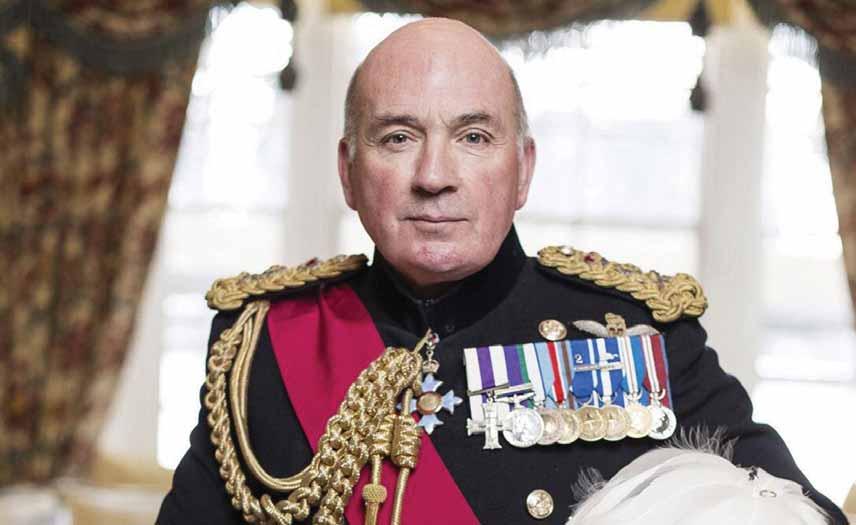 INTERVIEW BY VAZHA TAVBERIDZE
INTERVIEW BY VAZHA TAVBERIDZE
We have to recognize that the Ukrainian army has worked extremely hard, at much expense in terms of casualties, over the summer months. But I think it's fair to say the West was slow to decide to give Ukraine the weapons it needed to launch this counter offensive, - General Lord Sir Richard Dannatt, former Chief of the General Staff of UK Armed Forces, tells Radio Free Europe’s Georgian Service. “It took a long time to decide to send tanks, armored infantry fighting vehicles, self-propelled artillery, sufficient ammunition, long range artillery, and drones. And indeed, it took quite a long time for Ukrainian forces to be trained in how to use that equipment. And while that was going on, the Russians were not idle: They spent the same period of time preparing comprehensive defensive positions, up to three lines of defense in many parts of the 1000km frontline, which has proved very difficult for the Ukrainian forces to penetrate,” he adds.
“There are areas, at some cost, where Ukrainian forces have managed to penetrate the first line, at places the second line of defense, but the thought and the hopes of early summer that Ukrainian forces, equipped with Western tanks and other equipment, would be able to not just break through the Russian lines, but to get into the Russian rear areas and cause the same kind of panic that we saw in September last year in the north of the country- that hasn't happened yet. It's not for want of Ukraine’s trying. But I'm afraid it's a reflection of the fact that the Russians have prepared very deep and very comprehensive defensive positions. With the onset of autumn and winter, and the poor weather coming, I think the likelihood of there being a decisive move on the battlefield in 2023 looks most unlikely. President Zelensky and the Ukrainian military have got to prepare for a much longer conflict, that neither they or their Western allies would have wished for. That's where we are now. No criticism at all of the Ukrainian military, but simply a reflection of the fact that the Russians prepared proper
defensive positions. And they have proved very difficult to penetrate.”
WHAT MUST IT FEEL LIKE FOR THE UKRAINIAN MILITARY LEADERSHIP AND PRESIDENT ZELENSKY TO BE CONSTANTLY ASKING THE WESTERN ALLIES FOR WHAT THEY NEED?
This has been a very frustrating process for President Zelensky and his senior leadership team, both the political leadership and the military leadership. Yes, eventually, the West has been giving much of what Ukraine asked for, but that gifting has been slow, and valuable time has been lost. And while that valuable time was being lost to Ukraine, the Russians made good use of it by preparing these comprehensive defensive positions. And we are in the same position now, with discussion about the availability of F-16 aircraft or other modern fighter aircraft for Ukraine. It is almost as if the West is trying to control the capability and capacity of Ukraine to really carry out its mission of freeing its sovereign soil from the Russian occupier. It's almost as if the West is pulling the strings, and only allowing Ukraine to do what the West is willing to allow it to do. Now, of course, there is concern about escalating the war, that if the West and NATO provide so much, and particularly if the war is then carried onto Russian soil, that it plays into the Russian political agenda of claiming that this is a war in which they are defending themselves against Western aggression, that NATO all along has been intending to attack Russia. Of course, that would be false. Yet, when you are at war, it is perfectly legitimate, in exactly the same way that Russia is hitting Ukrainian cities, factories, infrastructure, and the like, and has been doing so since the war began, for Ukraine to strike targets within or dive into Russia. That is perfectly reasonable in order to degrade the Russian military capability. It’s a facet of modern war. While it is a war limited in aims and limited in geography, it is certainly not limited in means, and there shouldn't be limits imposed on Ukraine to try and prevent it from attacking targets in Russia. If anything, it's important that the Russian people know that this isn't a war being carried on by “other people over there,” this is something that affects them as well.
WHILE ON ACTIVE DUTY, IF YOU HAD BEEN ASKED TO CONDUCT SUCH A COUNTER OFFENSIVE WITHOUT APPROPRIATE AIR SUPPORT, WOULD YOU HAVE DONE IT?
If the government of my country had required me to carry out such an attack, then, of course, I would. I think the question is, how would one have done it. There should have been a realization that the break-in battle was going to be very bloody, very difficult, and very old fashioned, and maybe more assistance should have been provided with the equipment needed to break through the Russian defensive lines. Such equipment does exist. And maybe that has not been supplied in sufficient quantity. There was a strategic miscalculation that underestimated the strength of the Russian defensive position. The related challenge that the Ukrainian army has had to face is that they've had to transform themselves from an army on the defensive, to one capable of carrying out an offensive. And that is very difficult to do during a war and while you're in contact. No criticism of Ukrainians, their soldiers’ determination, or their willingness to accept casualties, it's just the hard reality of trying to break in and break through solid defensive positions.
ACCORDING TO THE LATEST REPORTS, UKRAINE WILL BE GETTING ATACMS FROM THE US. HOW BIG AN IMPACT WILL THEY HAVE?
Every better and longer range weapon that Ukraine is provided with, the higher the chance of a major operational impact. We've seen it with the well-documented attacks made using British-supplied Storm Shadows. It was probably three Storm Shadow missiles that carried out this week’s hit on the Black Sea naval base. That is the kind of attack that the provision of ATACMS will enable - long range, precise, very effective. And of course, this gets back to the early part of our conversation about it being perfectly legitimate for Ukraine to strike targets deep inside Russia, because Russia started the war, and it must accept the consequences of the conduct of that war.
UKRAINE REPORTS THAT RUSSIA HAS LOST 275,000
TROOPS IN UKRAINE SO FAR. EVEN IMAGINING THE REAL NUMBER IS HALF THAT, HOW MANY MORE CAN PUTIN AFFORD TO LOSE?
If you take the fact that he attacked with a force of about 180 - 190,000, it seems very likely that he has lost, killed or very seriously injured at least that number. It’s a horrific casualty bill. Ukraine has also suffered horrific casualties, let's assume between a third and half the number the Russians have lost. It is a very high toll for both countries, bearing in mind that the Russian population is about three times the size of the Ukrainian. It means the provision of manpower by both sides is particularly difficult. Perhaps less difficult for Ukraine, because they have the absolute determination to free their country from an invader. Ukraine will always find people who are willing to go and fight, although that can't go on forever. But in Russia, it's a war that many of the soldiers haven't really got their heart in. The Russian way of using manpower is pretty indiscriminate, with a pretty low regard placed on human life. And over time, it will have a cumulative effect, and it will become increasingly difficult for Putin to find men willing to fight in his war in Ukraine. That is a major area that needs to be worked on, to get as much information through social media channels, through any channel possible, to the Russian population, that this is an illegal war being conducted by the Kremlin elite for their own purposes, that it's costing a huge number of Russian young men's lives. This is a message that someone has got to get out there to the Russian people, to change their attitude towards their government. It may have long been the Russian way of war, this complete disregard for human life, but that doesn't mean to say one should give up on the attempt to try and get a better understanding out to the Russian people. Doing so is much more likely to end this war in Ukraine's favor.
YOU HAVE OPENLY STATED THAT THE UK SHOULD HAVE SENT MORE MILITARY ASSISTANCE THAN IT DID. HAS THAT SHIP NOW SAILED?
Yes. Unless there is a breakthrough before winter settles in, and I would very much
like to see that happen, I think we have to accept that the war is going into a deep freeze over the winter, during which time the Russians will continue to improve their defensive positions. And we may find that the frontline solidifies into one that is very difficult to shift. This then opens up the whole question of how is this conflict then progresses - received wisdom is that conflicts like this are resolved by negotiation, but the negotiation positions of President Zelensky and Vladimir Putin are irreconcilable. Zelensky, quite properly, wants every square kilometer of Ukrainian territory, including Crimea, back under Ukrainian control, while Putin has to get something out of this war, to control at least some proportion of Ukraine's territory, in order not to appear to the Russian people that he has been defeated. So it's very difficult to find what the opening positions for a negotiation might be. It’s a challenge that's going to have to be considered over the course of the next few months. There is also the wider concern that Western support for Ukraine may start to tail off, and what will happen in the United States with the presidential election. President Biden remains very committed to supporting Ukraine, but we don't know if he will stay as the US president. A lot of people are concerned that Donald Trump might come back. I find that improbable, but the wider point is that there is concern that time is not on Ukraine’s side; time is on Russia's side. Western support and enthusiasm to support Ukraine will diminish, and that will increasingly put Putin in a stronger position. So it is difficult to see an early conclusion to this conflict. It's actually also quite difficult to see a medium to long term solution to this conflict. It is conceivable that it could be decided in the same sort of frame that the Korean Peninsula is in. That war stopped in 1953 as a result of a ceasefire, but there's no peace agreement, it’s a frozen war. If the same happened in Ukraine, it would not only be disastrous for Ukraine, but for Europe too, because at any moment the Russians could decide to resume their offensive. And then there's the whole question of who makes good on the damage caused in Ukraine by the Russian attack? We may say it’s on Russia to fix it, but Russia won’t if the conflict is unresolved and it is holding part of Ukrainian territory. What seemed like a reasonable hope in the spring and early summer that there could be a decision in 2023 on the battlefield seems unlikely to happen now. Other ways to resolve the conflict are difficult to imagine.
YOU WROTE THAT PUTIN IS NOT JUST A THEORETICAL THREAT LIKE HITLER, BUT AN ACTUAL THREAT, AND THE UKRAINIANS ARE BUYING US TIME, IN BLOOD, TO DECIDE HOW TO RESPOND TO THE NEW CHALLENGES TO EUROPEAN SECURITY. HOW IS THE WEST USING THAT TIME?
There is no doubt that Ukraine is paying in its blood for the removal of the threat of Russian aggression to wider Europe. But, assuming that Ukraine wins this war, and the Russian forces withdraw from Ukraine, then has the threat to the security of Western Europe been removed? Or does Russia continue to be a threat to it, or to the Baltic states, or to those countries that border Russia? It’s an unknown. Russia could maintain an aggressive stance towards the West, and so the West is wasting the time that Ukraine is buying it by not increasing its defense spending now, not increasing its military capability now, and putting itself in a better position to deter future Russian aggression. Is the West using the time that Ukraine is buying it wisely, or is it making the same mistake it did in 1930s?
“Time is not on the Ukrainian side, it is on Russia's side”
What our means of mass communication are doggedly feeding us on an everyday basis, and accordingly shaping our mindset, is not what we actually represent, and here is the proof: two young Georgians have recently conquered the international arena with their wit, talent and professionalism, and this can only be symptomatic. This is what we, as a nation, are all about: not the everyday senseless and cantankerous political bickering we the people are forced into listening to against our will.
The summit on world diplomacy and healthcare policies was recently held again in Dubai, under the title of ‘Best Diplomats, 2023’. This is an annual conference, comprising about 100 countries of six continents, and using as regular venues five spots: New York, Malaysia, the Philippines, Istanbul and Dubai. This year’s summit lasted three days, and was packed with a plethora of activities, cultural programs and national exhibitions.
Georgia was represented by only two delegates: the junior of the Caucasus University political and international relations department Nodar Bokeria, and his business partner, Doctor Giorgi Bokeria (not related), a doctoral student
of healthcare policy, representing the international medical association ‘Doctors Without Borders’.
The worldwide selection of candidates for participation in the Summit was conducted in two stages: First, based on a letter of motivation plus the resume, and second, a scientific paper and the resolution thereof, to be presented to the conference while in session. Both Georgian delegates passed those two stages more than successfully, after which they received the invitation from Dubai to the Summit. In his thesis, Giorgi accentuated the current problems in world healthcare politics, such as poverty, lack of medical service in the countries where people need it most, assistance to people who have suffered as a consequence of wars and conflicts, adequate provision of medical services for those suffering in war zones. Nodar Bokeria’s report at both sessions of the conference touched upon current topical problems of the Georgian Republic in the global context, the review of democracy in the United States and Europe, human rights, and Georgia’s strategic development.
By the vote of the majority of the attending conference delegates and based on the decision of a jury of professionals, the grand pris for the title of the World’s Best Young Diplomat went to Nodar Bokeria, representing Georgia, while in the field of healthcare, the title of Best Leader and Negotiator
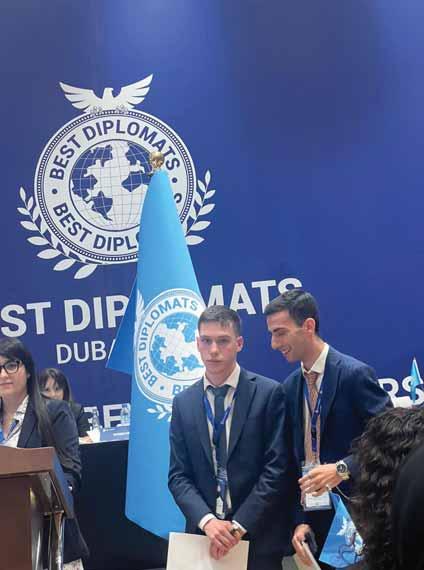
was awarded to Giorgi Bokeria. This nation should be proud of these two boys, still diligently sitting at their university desks, stubbornly determined to achieve the career heights any young man or a woman would dream of in any part of the world. The Dubai summit was a huge experience for them in their salad years. Isn’t it amazing that at this age of personal and professional immaturity, one can be capable of demonstrating full-fledged maturity in the field one is trying to master with nerve and zeal, thus proving to your country, your friends and relatives, colleagues, and, of course, to your own proud and responsible self that you can without doubt make it to the better end? Things like this do not happen accidentally. It takes a lot of investment– time, energy, talent, knowledge, skill and, finally, youth, but all is definitely worth it, because this is exactly where the future of this nation is being carved and tempered. Georgia has that much and that qualitative resources and potential. What is left though is to know the cache where that genuine and ready-for-action talent is deposited and poised for further deeds to the benefit of our people; not forcing them to seek out a life outside of this country to serve other nations’ vested interests, but encouraging them to give their talent and energy to their native land. And for this to happen, in the first place, we have to identify all of them,
 BY MARIAM GORKHELASHVILI
BY MARIAM GORKHELASHVILI
At the government session, Prime Minister Irakli Garibashvili announced that all winegrowers whose crops were damaged by hail will receive 3,500 GEL per hectare from the state. The Prime Minister expressed hope that the winegrowers will use the amount in a targeted manner.
“Unfortunately, too many growers lost
thousands of hectares of vineyards. Their crops were destroyed. We said that we will take these damaged grapes, and we are doing so. The process has started. We have already collected grapes worth 20 million GEL. But despite this, since they were harmed, we decided, as we did two years ago, to help the affected winegrowers and allocate 3,500 GEL as aid for each damaged hectare. This will help them in a targeted way to save and restore the damaged vineyards,” Garibashvili said.
According to the statement made on September 4, the state will take the grapes damaged by hail for 0.9 GEL.
Oil prices increased on Monday, with Brent oil rising by 0.3% or 25 cents to reach $92.45 per barrel after a 90-cent decrease at the end of the previous week. West Texas Intermediate (WTI) also saw a slight increase of 29 cents, reaching
$91.08 per barrel.
During the third quarter, both types of oil benchmarks rose by nearly 30%, driven by expectations of reduced oil supply in the fourth quarter. This expectation is based on the decision of Saudi Arabia and Russia to cut oil supplies by the end of the year.
Official sources indicate that the Organization of the Petroleum Exporting Countries, Russia, and OPEC+ are unlikely to change their oil production policy.
pin down with precision what they are good at, and give them the chance they deserve to have. Giorgi and Nodar Bokeria are young Georgian men with a tremendous resolve and valuable expertise
to serve as a perfect example to their deserving peers, just as gifted and strongminded as they are. Sakartvelo, please don’t let them abandon their beloved land and people! You need them badly!
The Georgian government confirmed its allocation of 73.2 million GEL from the state budget for the Starring Georgia campaign, which aims to bring world stars to Georgia over the next two years. The mentioned amount, which includes artists’ royalties and other expenses related to holding such events, was received by Black Sea Arena Georgia LLC last year to prepare for the two-year season.
“In 2022, LLC Black Sea Arena Georgia received 73.2 million GEL to organize various events planned for 2023-2024. The mentioned amount includes both artists’ fees and other expenses related to the organization of events,” the document says.
Concerts by The Killers, Imagine Drag-
ons, and Bruno Mars have already been held as part of the Starring Georgia campaign. Prime Minister Irakli Garibashvili announced the plan to bring world stars to Georgia last year. Garibashvili said that 70 million GEL from the budget

would probably be spent on concerts, of which up to 28 million GEL would be directed only to the events of 2023. He added that the country can expect to receive up to 150 million GEL income this year from the campaign.
 BY MARIAM GORKHELASHVILI
BY MARIAM GORKHELASHVILI
The 2024 state budget project anticipates government tax revenue of 18.3 billion GEL, representing a 1.6 billion GEL increase compared to the 2023 forecast.
In more detail, the tax revenue breakdown for 2024 is as follows:
– Income tax: 6.2 billion GEL (682.6 million GEL more than the 2023 forecast) –
more than the 2023 plan)
lion GEL more than the 2023 forecast)
– Import tax: 161.2 million GEL (11.2 million GEL more than the 2023 forecast)
The privatization income forecast
remains at 350 million GEL, consistent with 2023. The total combined budget for 2024 is expected to be 27.8 billion GEL.
Source: businessformula.ge
In August 2023, the number of persons receiving a monthly salary increased by 4.0% compared to the corresponding period of 2022 and by 6.1% compared to the corresponding period of 2021.
In August 2023, the share of persons receiving a monthly salary up to 600 GEL amounted to 19.1%, which was 4.1 percentage points less than the corresponding period of 2022, and 8.5 percentage points lower than the corresponding period of 2021.
In August 2023, the share of persons receiving a monthly salary of 2,400 GEL and more amounted to 24.0%, which was 4.4 percentage points more compared to the corresponding period of 2022, and 8.3 percentage points higher than the
In August 2023, compared to July 2023, the total number of vacancies published on jobs.ge increased by 1.5%.
In 2023, from March to August, a total of 8,048 vacancies were published in the field of finance, statistics, which was 37.5% higher than the corresponding period of 2022 and 90.9% higher compared to the corresponding period of 2021.
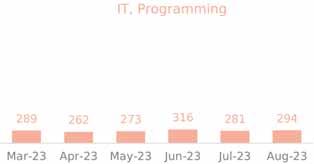
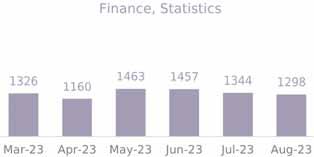
In 2023, from March to August, a total of 11,312 vacancies were published in sales, procurement, which was 2.1% lower compared to the corresponding period of 2022 and 62.2% higher compared to the corresponding period of 2021.
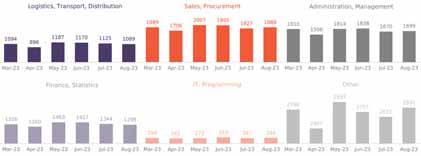
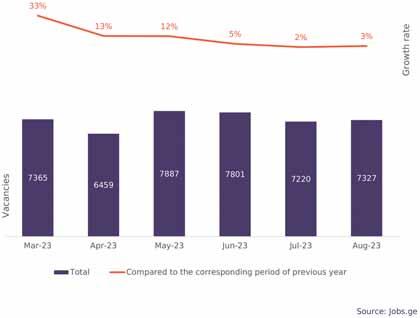


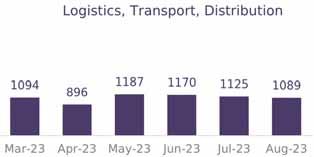
In 2023, from March to August, a total of 10,337 vacancies were published under administration, management, which was
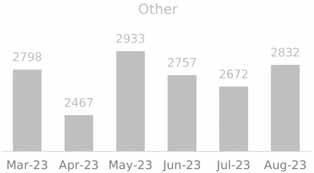

corresponding period of 2021.
In August 2023, the share of persons receiving a monthly salary of 9,600 GEL and more amounted to 2.1%, which was 0.4 percentage points more compared to the corresponding period of 2022, and 0.8 percentage points higher than the corresponding period of 2021.
In 2023, from March to August, the total number of vacancies published on jobs.ge amounted to 44,059, which was 10.2% higher compared to the corresponding period of 2022.
26.0% higher compared to the corresponding period of 2022, and 66.5% higher compared to the corresponding period of 2021.
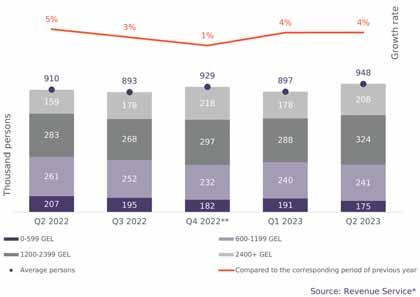
According to the Beveridge curve , the Georgian economy was undergoing a phase of expansion in the pre-pandemic period (Q1 2018 to Q4 2019), with a decreasing unemployment rate and an increasing job openings rate, i.e., with rising tightness on the labor market.
According to the Beveridge curve, the Georgian economy went into a recession

phase in the pandemic period (Q1 2020 - Q4 2020) with an increasing unemployment rate and decreasing job openings rate.
The Beveridge curve shifted outwards from its origin as the COVID-19 restrictions were gradually lifted in Q1 2021. In this period, employers’ expectations increased, which resulted in a higher job openings rate, though unemployment remained nearly the same. This shift points to a decrease in efficiency in the labor market. It is worth mentioning that the Beveridge curve shifted outwards again in Q2 2021 indicating a further decline in the labor market efficiency.
In the period of Q3 2021 – Q2 2022, the Georgian economy returned to a phase of expansion while the labor market tightness started to mount with the decreasing unemployment rate and the increasing job openings rate but at a lower efficiency level compared to its pre-pandemic state. Going by estimates, the Beveridge curve might have shifted once again in Q3 2022 – this time towards the origin since the unemployment rate decreased sharply and the job openings rate increased slightly, perhaps indicating a move of the labor market efficiency towards its pre-pandemic level but not there yet. However, to draw final conclusions, it is necessary to observe further changes in the labor market.
According to the Beveridge curve, in Q1 2023, compared to Q4 2022, the efficiency of the labor market decreasedthe unemployment rate and the job
openings rate increased, bringing the labor market back to the previous efficiency level observed in Q3 2022.
According to the Beveridge curve, in Q2 2023, the efficiency of the labor market increased, compared to Q1 2023, as the unemployment rate decreased, and the job openings rate fell, indicating further movement towards the pre-pandemic
efficiency level.
To sum up, the labor market efficiency is still lagging behind its pre-pandemic level, which could be attributed to different factors, including the flow of personnel to adjacent sectors due to changes in the country’s economic structure, labor force migration, and increased wage expectations of job-seekers.
An engaging and thoughtprovoking series of public discussions on human rights and liberties returned in September, promising to be an inspiring journey of discourse and reflection throughout 2023. The discussions are supported by the European Union (EU) and the United Nations Development Program (UNDP), in close partnership with the Union of Tbilisi Museums – Ilia Chavchavadze LiteraryMemorial Museum.
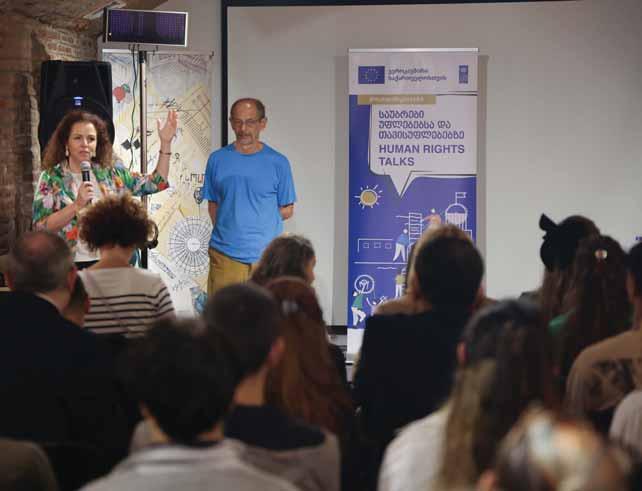
The fifth event of the series, held on 29 September, brought together scholars, journalists, and youth, all convened to explore the challenges faced by modern societies in upholding the fundamental right of freedom of speech and expression.
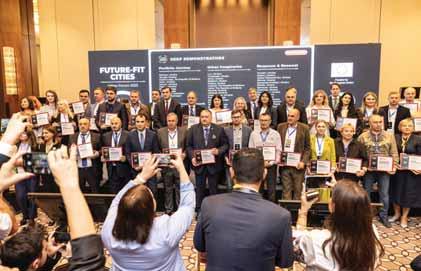
Gogi Gvakharia, a distinguished art expert, professor at Ilia State University, and highly regarded journalist at Radio Tavisupleba, the Georgian branch of Radio Free Europe/Radio Liberty, delivered the keynote address. His thoughtprovoking presentation served as a catalyst, sparking a spirited debate on the delicate balance between personal freedoms, fundamental human rights, and societal beliefs.
Gvakharia's insights captivated his audience, which represented a mosaic of perspectives, from civil society representatives to a group of schoolchildren from the town of Gardabani and Ajara Highlands. This diverse blend of voices underscored the importance of engaging
various segments of society in the discourse on human rights.
"The EU is honored to support Human Rights Talks in Georgia to foster a space for dialogue and understanding. These talks are a way for people to share their ideas, learn from each other, and chart the way toward a more equitable society that cherishes the rights and freedoms of every individual," said Asunción Sánchez Ruiz, Deputy Head of Delegation, Head of Political, Press and Information Section at the Delegation of the European Union to Georgia.
"Human Rights Talks provide a platform for an inspiring array of speakers, each offering unique perspectives and valuable life experiences. It’s fascinating to see young people from all over Georgia getting involved. They are our dedicated listeners and active contributors. We hope that this collective dialogue will inspire us all to take action together and build a world where everyone’s rights are protected," said Anna Chernyshova, UNDP Resident Representative a.i. in Georgia.
###
The Human Rights Talks represent a pivotal component of the Human Rights for All initiative, a comprehensive project aimed at empowering Georgia to cultivate a culture of human rights, fortify human rights protections, and address longstanding concerns. This initiative, supported by the European Union, is spearheaded by two UN agencies, UNDP and OHCHR, with over EUR2.5 million in EU funding.
into alternative development pathways thanks to the EU and UNDP support.”
The Forum surveyed the current urban landscape and charted a path forward to build resilience and promote environmentally sustainable development, even in the face of crises. The discussions addressed critical issues, including leadership challenges and financial sustainability. Participants had the opportunity to accelerate their knowledge and expand their partnership network within the Mayors for Economic Growth (M4EG) community and beyond.
International speakers representing renowned urban development institutions such as ARUP, the Creative Bureaucracy Festival, the Center for Public
Impact, Demos Helsinki, CHÔRA, etc., and international organizations including the European Bank for Reconstruction and Development, as well as municipal representatives from countries such as Georgia, the Republic of Moldova, North Macedonia, and Ukraine, shared their valuable insights, enriching the discussions.
###
Background: The M4EG Facility draws on the Mayors for Economic Growth Initiative, launched and funded by the European Union (EU) in 2017. Since 2021, the EU-funded M4EG Facility has been managed by UNDP in close cooperation with the EU, local authorities and a range of partners.
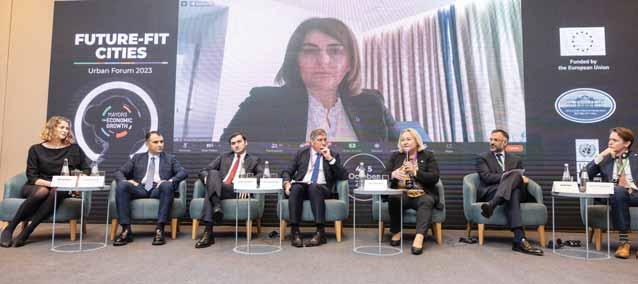
More than 200 participants from Eastern Partnership cities convened in Batumi, Georgia, for a two-day urban forum organized by the DirectorateGeneral for Neighborhood and Enlargement Negotiations (DG NEAR) of the European Commission, the United Nations Development Program (UNDP), and partners. The forum, titled "FutureFit Cities,” focused on how to tackle complex municipal issues by building green, inclusive and resilient cities, capable of leveraging public-private finances to boost growth and innovation.
Gérald Audaz, Team Leader for Eco-
nomic Development, Connectivity, and the Green Transition in Eastern Partnership countries at DG NEAR, European Commission, emphasized the importance of the collaboration between the EU, UNDP, local authorities and European and International Financial Institutions to mobilize more public and private resources and tap into the opportunities offered by the EU’s Economic and Investment Plan for the region.
“Together, we aim to empower local authorities to shape green and prosperous cities and assist them in leveraging more financing to achieve their ambitions,” Audaz said.
Lejla Sadiku, Knowledge and Innova-
tion Team Leader at the UNDP Istanbul Regional Hub, said that cities are the engines driving global prosperity, but that they also bear the weight of 75% of resource consumption and 60-80% of greenhouse gasses. “The municipalities in Eastern Partnership are going through challenging times, but gathering and discussing critical issues helps us move forward towards economic growth,” she noted.
Archil Chikovani, Mayor of Batumi, noted that Batumi is glad to host such a gathering for Mayors. “We can already see how the city benefits from the dynamic engagement with the Mayors for Economic Growth initiative and are tapping
Ihave to admit now, that even though my wife and I have left Svaneti for the second winter in a row, with our house empty for the first such time, an image remains from there burned into my consciousness. It’s that picture of Death, as a huge angry skull, which appeared to me for a few days mid-September in light snow, on the “mountain wall” overlooking Etseri from the other side of the Enguri river.
People either see it straight away when I show them the photo, or “get it” when I point out the skull’s features. I suppose this depends on the degree to which each viewer is afflicted, as I am, with pareidolia, the seeing of such figures in nature’s random places. Clouds, shadows, rust and the like.
But I… can hardly look away.
I’ve already found Death a place in two of my short stories on Svaneti which arise from my photos. He may make other appearances too. But I confess that I have to be careful to whom I show the photo. It’s not exactly the most appeal-
ing thing anyone wants to be shown, the most beautiful, though awesome it may be. It is Death, after all.
“Hey, want to see my photo of the face of Death?”
“Er, wow, look at the time! Must dash… I have a thing to do…” Swish of air as the cornered person makes good their escape at speed. Have I brought trauma? Fear? Concern? Can they dare to admit being both fascinated and repelled by my offer?
Do I sound obsessed, I wonder, or deranged? Hard for me to judge from the inside. I do feel that I have been entrusted with a rare image, polarizing, beautiful if terrifying, and must steward it carefully. I had never seen it in 12 winters in Svaneti until it showed up last month. It may never appear again, or may recur every autumn: time will tell.
As for the concept of Death… I’m aware that it’s an elephant in the room, present for all of us in potential but something we are loath to point out. Maybe if we ignore it it’ll go away, or at least shrink a bit, and we can breathe a little easier?
No such luck, I think. It’s here to stay, for the foreseeable future, until we can all take a big dose of sci-fi and upload our consciousnesses into quantum computers. Which, even then, who knows if
the resulting copy will even be me?! I digress. Death, the skull, monstrous, has visited me and allowed himself to be captured on film, not your average unprovable UFO or psychic phenomenon or haunting or whatever, but something I have photographed for posterity. (And maybe for printed posters too.) What on earth do I DO with him?
I hope that the remaining images which come to my ever-vigilant eye will be kinder, more gentle and less malevolent, but I am not guaranteed the fulfilling of this wish. Until now, my story-inspiring photos have all been of this more benevolent kind, to inspire awe perhaps, but no terror. The story collection will continue to grow as they parade themselves before me, however. In the meantime, I can only watch, and wait.
Tony Hanmer has lived in Georgia since 1999, in Svaneti since 2007, and been a weekly writer and photographer for GT since early 2011. He runs the “Svaneti Renaissance” Facebook group, now with over 2000 members, at www.facebook.com/groups/ SvanetiRenaissance/ He and his wife also run their own guest house in Etseri: www.facebook.com/hanmer.house.svaneti

transformed into little planes of existence which sparkle with imagination.”
The exhibition also features a small selection of works by Nika Khabelashvili and paintings by Iru Meladze. Nika is a traveling artist who has already exhibited his works in Germany and Poland. He says he is inspired by the nostalgic quality that reclaimed metal provides when used as a canvas. Iru is a multimedia artist based in Tallinn, Estonia, who paints bright forms on rusted metal using an acrylic-PVA glue mix.
Be sure to go and see their fascinating works on display throughout the month of October.


THE EXCHANGE
109 Aghmashenebeli Avenue, Floor 2, Tbilisi Gallery open Tuesday – Saturday, 11am – 7pm. Closed Sundays and Mondays.
BY KATIE RUTH DAVIESPhotographer, journalist and Svaneti guest house owner
Tony Hanmer has united with two other artists to display his photographs in a group exhibition titled ‘Rust, from Corrosion to Beauty’ at The Exchange Gallery (address below).
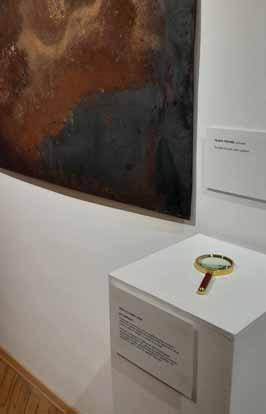
Tony noted it is his first show in 15 years, and may be the first of more to come.
Tony has been sharing his photography journey with us through his weekly blogs for GEORGIA TODAY. He has a unique eye for details, known as pareidoliaseeing in the most mundane objects, light, shadow, and landscapes, dragons, dancers, animals, people and other outworldly forms, from which he weaves
stories and legends. His latest passion has been photographing the natural formation of rust on sheets of iron in Tbilisi’s metal yards, then digitally enhancing the colors and contrast to create beautiful images whose forms can be imagined into anything your mind allows. Alongside 16 examples of his unique creativity, Tony has hung a metal sheet as proof of the wonder of nature. Beside it is a magnifying glass, which eager visitors can use to study both the rust and the colorful printed photographs for a closer look at their finer details. Tony has also placed a notebook nearby to encourage guests to study the images more closely and to jot down what they think they see in the forms and lines.
“I’m not out to document reality but to find or make beauty everywhere I go,” he tells us. “Even something as entropic, mundane and undesired as corrosion from moisture on ferric surfaces can be
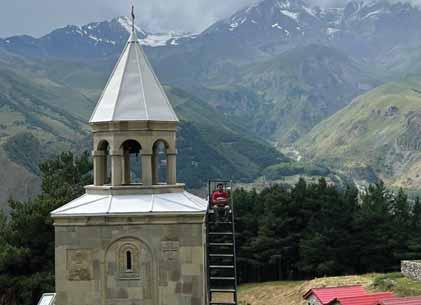 REVIEW BY RYAN SHERMAN
REVIEW BY RYAN SHERMAN
The art of history, so they say, was born in the flickering of a campfire. ‘Character in Georgia,’ by Aka Morchiladze and Peter Nasmyth, returns us to this historical ethos as a litany of tales to be shared and celebrated.
In its pages, we meet Georgia’s noble bandits, such as Arsena of Marabda, and its intellectual luminaries, such as Ilia Chavchavadze. They emerge from the past fully-fleshed and ready to re-live the stories that inform the modern Georgian national character.
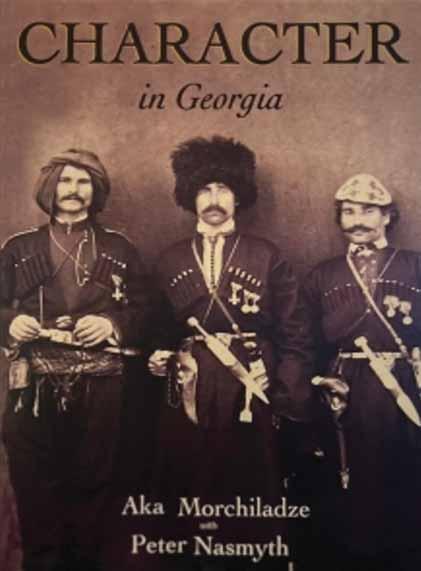
To the English speaker, this book is nothing short of a gift for anyone hoping to get past the curtain of khinkali, good wine, and mustachioed men in chokhas.
Character is an inspired version of Kartulis Rveulebi (Georgian Notebooks) by Aka Morchiladze, a historian and Georgia’s most celebrated contemporary writer of fiction. With the help of the talented translator Maya Kiasashvili, the text was placed in the hands of Peter Nasmyth, a well-known British writer who has lived part-time in Georgia for 30 years and authored a small collection of well-received books on the country.
The key to Character’s accessibility to the English-speaker is Nasmyth’s charming writing style and deep appreciation for his subject. Morchildaze’s original audience was, of course, the Georgian public, who require no introduction to the characters, contexts and geographies that provide the landscape of the book.
Perhaps the most impressive achievement of Character is the mastery with which all necessary facts and historical contexts are woven seamlessly into the
original text. Over its two hundred pages, no clashing of voice or style is detectable, and the book lives up to the bold claim of its introduction as having been written by a single Ango-Georgian being, (who, now animated, we must pester to build upon its debut).
This book is like no Georgian history book you will ever read, and I struggled to find a comparison. Perhaps the psychoanalyst Bruno Bettelheim can be of some help here. In his wonderfully (albeit partially plagiarized) book The Uses of Enchantment, Bettelheim explains how the formation of fairy tales is a collective social process. Storyteller after storyteller reshapes a single story, like Little Red Riding Hood, until it becomes pregnant with rich underlying meanings – anchors in the landscape of early experience.
While remaining true to historical fact, Aka Morchiladze followed not a dissimilar process. Once, long ago, he explains, he dove deeply into the events of one hundred years ago. The stories he shares are those that “clung to [his] mind.” At their core, these tales do not strive to achieve a meticulous recording but rather are the shapes forming from “impressions or essences.” What emerges is a dialogue of reflection between the Georgian writer and the Georgian past – the histories and identities that animate the Georgian character today.
In Chapter 11, for example, we learn why, as opposed to how (or worse yet, that) the muse of the theater ambushed the makeshift stages of Georgia in the late 1800s. Across the country, every imagination was captured. Georgia’s first crop of young actors were catapulted onto the echelons of celebrity. “Georgians,” we are shown, “are born with the instinct for drama running through their veins.” Today, they remain masters of the stagecraft of dramatic reinterpreta-
tion, thanks not to mimicry or cultural diffusion, but because this is a natural manifestation of the Georgian character.
‘Character in Georgia’ also offers a front row seat on the spontaneous emergence of Georgian socialism – a true form of distributed communal governance whose origins lie not in the spectacles of stuffy Marxist academics but the forested hills of Guria. We owe these inspirational models (twice crushed by imperialists) to the peasants and the anti-Czarist pirlebi (outlaws). This was a faithful form of political organization spun from “the poor man’s sense of fairness, blended with a code of chivalry –and a bit of intrigue.”
After finishing ‘Character in Georgia,’ what most surprised me was that the entire book runs hardly 200 pages. This surprise was not because the book is dense – on the contrary, it almost reads itself – but because upon putting it down, I felt as though I had imbibed a tremendous amount of rich material in almost no time, as if Morchiladze and Nasmyth had devised some sort of science fiction contraption to allow the brain to absorb realms of history in matters of seconds. This, however, makes the job of the reviewer all the more challenging, and with some difficulty I must resist ending with a hackneyed “this book is a must read!” In ‘Character’ you will learn about Georgian nobility and peasantry. You will see a strange young Ioseb Jughashvili hiding in a hay cart. You will bear witness the poetic mountain visions of Vazha Pshavela, and mourn the tragic life of the beautiful master of Naïve art, Niko Pirosmani. You will meet a fragile Iokob Gogebashvili who ushered the Georgian language into the 20th century with his children’s primer ‘Deda Ena,’ and learn about the ever-agitating against Russian imperialism, the history of Tbi-
lisi, the first Democratic Republic of Georgia, and, to coin a phrase, “oh, so much more!” One final suggestion. I have heard that on special occasions, a foreigner, upon landing at Tbilisi International Airport, and after corralling through the everedgy scrutiny of passport control, is sometimes rewarded with a bottle of Georgian wine of welcome. This most charming of practices is one I have never
timed correctly myself, but I hope one day the powers that be, in a moment of traditional Georgian big-heartedness, will elect to expand on this custom by adding a token of Georgian literature to introduce the newly arrived to the rich cultural world they are about to enter. And, should this ever happen, if I may, they will find no better choice for the honor than ‘Character in Georgia,’ by Aka Morchiladze and Peter Nasmyth.
But what was Danibegashvili’s background? He was a wealthy merchant and nobleman from Tbilisi who came to the author’s country India; he set sail from Muscat in Oman and 22 days later, he disembarked in Bombay, now known as Mumbai, the financial capital of Maharashtra state in India. What did he see in Bombay? He wrote in his travelogue that “…because of its position, it may be called the chief English port. From here, ships sail to China, Persia and India. Another source of the fame enjoyed by Bombai (Mumbai) is that the finest English ships are built there.”
BLOG BY ARUNANSH B. GOSWAMIWhen I was in Georgia, I visited the tomb of King Erekle II, King of Kartli and Kakheti (Eastern Georgia) located in the Svetitskhoveli Cathedral in Mtskheta, this king came to India when he was a prince as a hostage of Nadir Shah, the Emperor of Iran, who was at the time invading India. We can learn more about his Indian connections from a travelogue called “The travels of Rafail Danibegashvili in India, Burma and other Asian countries, 1795-1827,” written by Georgian statesman and traveler Rafail Danibegashvili. Who was this traveler, and what did he see in India, a country known for its diversity? I will try to answer these questions in this article.
India is a civilizational state with huge diversity, and for centuries, travelers from different parts of the world have been coming to India to explore its diverse landscape and learn about the Indic religions. Georgia's relations with India have their roots in remote antiq-
uity. Trade flourished between them long before the new era set in. The great trade route linking India with the Mediterranean countries passed through the Transcaucasus, in particular, through Mtskheta, Fazis (now Poti) and other towns. In the town of Varanasi, India, there is a gravestone, the inscription on which, in Georgian, says there lies the Georgian merchant Tamaz Khuduashvili of the village of Kojori (near Tbilisi), who died in 1782
Some of the travelers who came to India in the past were Al-Masudi, FaHien, Hiuen-Tsang, Marco Polo, Abdul Razak and the aforementioned Georgian nobleman, Rafail Danibegashvili, in whose travelogue it is mentioned that in Madras (now known as Chennai), there lived a wealthy Armenian (Shakhamiryan), who sent King Erekle II gifts every year in order to help him create an independent Georgian-Armenian kingdom. In reward, the king presented him with the large village of Loris and directed Danibegashvili to take the title-deed to him, and in order to follow the order of the king, the nobleman left for India on 15 March 1795.
Unfortunately, the Armenian he was supposed to meet passed away a year before his arrival, and so he gave the title-deed to the Armenian’s son.
Mumbai was indeed then under the control of the English East India Company, and an Indian conglomerate that even exists today, Wadia Group, constructed the first ships for the British navy outside England in Mumbai, the city that Rafail Danibegashvili visited. The Wadias are Zoroastrians or Parsis, and Georgian readers likely know that there are the remains of a non-functional Zoroastrian fire temple in Tbilisi today. Of the Zoroastrians and Mumbai, Danibegashvili wrote in his travelogue that “This town (Mumbai) is particularly famous for its merchants, who are extraordinarily rich. Generally, all the local inhabitants are fire worshippers and call themselves Kabers or Farses.”
While Mumbai, located on the western coast of India, was colonized by the English, another settlement on the eastern coast of India, Pondicherry, now known as Puducherry, was colonized by the French. Of this settlement, Danibegashvili wrote “...I sailed to the town of Bondochery or Kost-Malvar (Puducherry).
This town was formerly ruled by the French, but is now in the possession of the English. It is built after the model of European towns. A fairly large part of the inhabitants are French, who may be called old-timers. The native inhabitants, like those in the surrounding towns, are fire-worshippers and black-skinned.”
Another big city in India is Chennai, which was a former presidency town during the British rule in India. Chennai was then known as Madras, and Danibegishvili
visited it, writing that “…In this town there are numerous and rare fruit, one of which is the pineapple. The water is good and the soil fertile. Some three versts from this town is the grave of St. Thomas, and six versts from there is the desert where the apostle lived and where now stands a monastery with a splendid church.”
India has had a thriving community of Eastern Orthodox Christians, their church being an Apostolic Church brought by Saint Thomas the Apostle to India, the traditions of Malabar, Coromandel and the Persian Church held that Thomas the Apostle died near the ancient town of Mylapore in India. St. Thomas became a martyr in A.D.72 and was buried in Mylapore, the very place visited by the Georgian traveler Danibegashvili.
Like Chennai, another erstwhile presidency town in India is Kolkata, then known as Calcutta, about which Danibegishvili wrote “…Kalcada is a very beautiful and rather magnificent town. There are many rich people in it. It is situated on the shore of the bay of the Ganges River. Many Armenians reside there. They live a rich and sumptuous life and pursue a thriving trade with foreigners. In addition to Indians, all of whom are generally idolaters, and Mohammedans, the natives proper, there are Englishmen, French and, most of all, Portuguese.”
Benaras is an ancient India city which Danibegishvili visited, and an important center of Shiva worship in Hinduism and Buddhism. Danibegishvili wrote about it in his travelogue that “…This town is revered by the Indians as a Holy City, and for that reason rich Indians who live to an old age leave their families and all their wealth, save for the amount of money required to maintain them for the rest of their lives, and, bidding farewell to their wives and children and to all their kin, go to this town with the intention of dying there. This tradition has become so deep-rooted that they say whoever dies in this town is delivered from all suffering in the future life, even if he deserves such suffering.
All the local inhabitants are generally idolaters. They hold the cow in great
esteem; even its urine is used to smear on the face and cleanse defiled vessels.”
Danibegishvili also visited the current capital of India, Delhi, and the mountainous region of India known as Kashmir. During my trip to Georgia, I saw the beautiful views of Caucasus mountains in Stepantsminda, where I stayed for two days, visiting the Gergeti Trinity Church and Icon of Elias of Stepantsminda (Saint George of Khedenish). I found Stepantsminda to be very similar to the Kashmir region of India when it comes to nature: while Stepantsminda is located in the Caucasus mountain range, Kashmir is located in Himalayas, and both have amazing natural beauty. Danibegishvili wrote about Kashmir in his travelogue that “…The environs of Kashmir are pleasing to the eye. In summer, the mountains round the town are covered with bright verdure. In the town itself, there are numerous canals, and in the middle is a lake which is nineteen versts in circumference. Near the lake is a mountain on which a stone fort has been built. The water in the lake is very pure, and the lake itself is fairly deep. On Fridays, the people sail on the lake in boats.” Even today, Georgian visitors can see Kashmiris rowing their boats in the Dal Lake. As per Levan Iosifovich Maruashvili, “Danibegashvili unequivocally sided with India. His sympathies lay with the courageous struggle of the Indian people against invaders, and on two occasions he noted with satisfaction that the English had failed to capture a town.”
The relations between India and Georgia are indeed very old. In 2018, a wall painting titled “Travels of Rafail Danibegashvili” was gifted to the Prime Minister of India Narendra Modi.
I hope the people of India and Georgia travel more to each other’s country and learn about each other’s culture, and in this way the diplomatic relations between these two countries will become even stronger. God bless the India-Georgia friendship.
Author: Mr. Arunansh B. Goswami Historian and Advocate in Suprene Court of India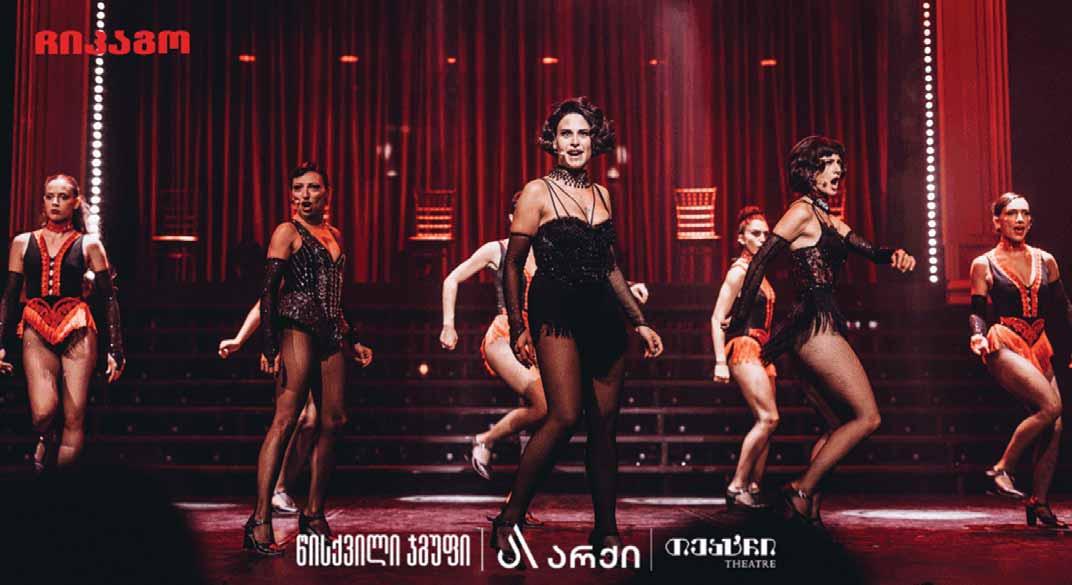
Anew type of theater has arrived in Tbilisi, and it hit the ground running with its debut on September 20 and 21, - the newly acquired adaptation of the musical ‘Chicago.’
‘Chicago’ is an award-winning American musical that has consistently been reenacted since it first appeared on stage in 1975. Set in the 1920s, the musical focuses on murder, crime, and jazz.
‘Theatre,’ a performance and events venue in Tbilisi, is hosting the adaptation of the musical.
Tea Kipshidze, author and screenwriter of the Georgian adaptation of Chicago, says even though the show is based in the 1920s, it still has relevance to today’s world.
“Chicago serves as a sharp satire, reflecting the culture of its era – corruption, crime, sensationalist media, and ‘blood,’” Kipshidze wrote on Theatre’s website. “Simultaneously, it tells the story of women during the rise of jazz and the reevaluation of gender roles. Thus, Chicago isn’t just a show leaving an indelible impression; it’s also a window into the 1920s, offering parallels with the present day.”
The musical has been such a hit over
the years, both for the pizazz it embodies of its generation, but also since the production is based on real facts and characters. Chicago tells the story of a play written in 1926 by a crime reporter for the Chicago Tribune who covered trails around the city. Two of her trials included Belva Gartner, a woman accused of murdering her husband and sister, and Beulah Annan, who was accused of murdering her lover.
The licensing for the musical was secured by the Tsiskvili Group, from the theater company Concord Theatricals. The presentation and sponsorship of the show comes from Archi, a leading development company in Georgia. Originally Archi was only going to be a back-seat spectator of the Tsiskvili Group project, yet, once they heard Chicago was going to be one of the shows on the lineup, they decided to become presenters too.
Archi’s General Director Shio Khetsuriani says he believes this musical will create long-lasting memories for everyone who comes to watch it.
“At Archi, we welcome, and support new projects created in the country, whether in culture, sports, or any other field. Therefore, when we learned that the theater was planning to stage the world-famous and well-loved musical Chicago, we decided to join this project as a presenter,” Khetsuriani said on the Theatre website. “We are confident that
PUBLISHER & GM
George SharashidzeCOMMERCIAL DEPARTMENT
Commercial Director: Iva Merabishvili
Marketing Manager: Natalia Chikvaidze
EDITORIAL DEPARTMENT:
Editor-In-Chief: Katie Ruth Davies
the show will leave unforgettable impressions on both Georgian and foreign attendees, contributing to the future promotion of this cultural direction. We are delighted to have the opportunity to collaborate with the Theatre and be co-participants in yet another innovative and successful project.”
Theatre, the venue itself, is a relatively new idea, because it is not a traditional venue used for watching plays. Instead, it is used for a variety of forms of entertainment, adapting as necessary to the event taking place.
“It is a space where you can experience a classic cabaret, see an American musical, enjoy opera and ballet performances, attend a concert, or listen to the works of modern artists,” the Theatre website claims. “Tourists can also discover Georgian cultural attractions accompanied by gastronomy. In a word, it is a space that offers creative freedom to create the environment you want.”
With Theatre’s new exploration of entertainment, the audience not only pays to experience a show, but they’re given a three-course meal tailored to the theme of the performance they’re watching. The new venture is called ‘Cabaret Nights.’ Cabaret is a form of entertainment new to Georgia, stringing together music, dance, song, and acting.
Four nights a week from Thursday to Sunday there will be a different cabaret
Journalists: Ana Dumbadze, Vazha Tavberidze, Tony Hanmer, Nugzar B. Ruhadze, Mariam Gorkhelashvili, Mariam Mtivlishvili, Erekle Poladishvili, Shelbi R. Ankiewicz, Lea Montagne
Photographer: Aleksei Serov
performance to experience, each of them paired with a unique dinner menu. There will be shows with artists, singers, dancers, illusionists and more. Everything from jazz to dance performances to musicals such as Moulin Rouge and
Website Editor: Katie Ruth Davies
Layout: Misha Mchedlishvili
Webmaster: Sergey Gevenov
Circulation Managers: David Kerdikashvili, David Djandjgava
choreography from French, Spanish, and Indian styles will be present. All the dinner menus for Cabaret Nights are perfectly crafted by Alex Natadze, the Tsiskvili Group chef.
“We are establishing cabaret-style spaces in numerous countries, and, while it’s not entirely new, the cabaret entertainment genre in Georgia is taking flight with the Tsiskvili Group’s Theatre,” Tsiskvili Group’s Head of Marketing Anano Tavkhelidze writes on the Theatre website. “Guests can freely choose their desired dishes, whether on-site, or through advance bookings, similar to our restaurant setup.”
Artistic Director of the theater Zaal Chikobava said Theatre is consistently changing and trying out new ideas. The business values feedback from its guests and with the new cabaret days, no two shows will be alike. Each week will be full of unique experiences and a celebration no one will want to miss.
For the Chicago showing there will be two menus, regular and vegan, which can be selected in advance or upon arrival at the event. Depending on which menu is chosen, it includes bread, a smoked pepper appetizer, beef ribs or fried polenta with mushroom fricassee, and a custom-tailored dessert.
There are only a few showings of Chicago; the next performance will be held on Oct. 6.
ADDRESS 1 Melikishvili Str.
Tbilisi, 0179, Georgia
Tel.: +995 32 229 59 19
E: info@georgiatoday.ge
F: GeorgiaToday
ADVERTISING & SUBSCRIPTION
+995 555 00 14 46
E-mail: marketing@georgiatoday.ge
Reproducing material, photos and advertisements without prior editorial permission is strictly forbidden. The author is responsible for all material. Rights of authors are preserved. The newspaper is registered in Mtatsminda district court.
Reg. # 06/4-309
Theatre is a space where you can experience a classic cabaret, see an American musical, enjoy opera and ballet performances, attend a concert, or listen to the works of modern artists
